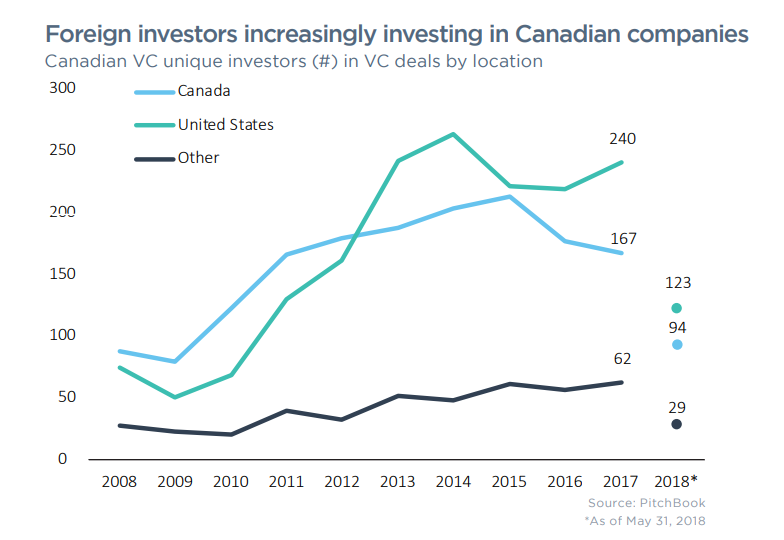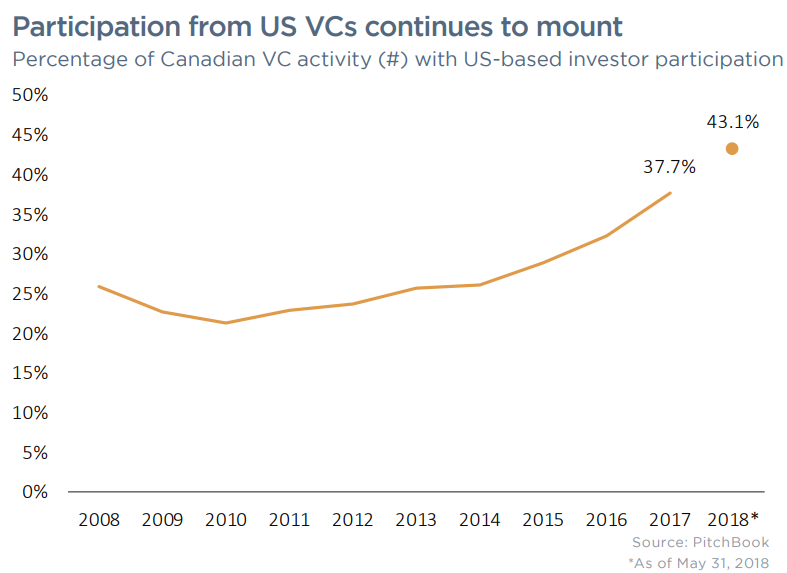Is Canada Tech’s Next Frontier? VCs Think So
KATE CLARK, PITCHBOOK (JUN 19, 2018)
Though tensions are rising between President Donald Trump and Canadian Prime Minister Justin Trudeau, relations between Canadian startups and US-based venture capital firms are thriving.
Historically, the lion’s share of venture capital has been funneled into companies in close proximity to Sand Hill Road, the famed street that’s home to some of the most renowned venture capital firms. And though Silicon Valley still receives the largest portion of VC, more and more funding is being poured into Utah, Colorado, Texas and other geographies that were once infrequently visited by VCs.
Investors from US-based VC firms are also traveling north to Canada more than ever, with Canadian startups attracting a record amount of US investment in recent years, according to PitchBook’s 1H 2018 Canadian PE & VC FactBook.

Canada has seen a healthy uptick in overall VC funding YoY. In 2016, deal value hit a decade high with $2.39 billion injected in some 500 deals, per the PitchBook Platform. So far in 2018, startups have secured $1.3 billion across 178 VC deals. Companies based in Toronto and Montreal, Canada’s largest tech hubs, have pulled in roughly one-third of that total.
“The biggest growth market will be in Canada, and it’ll be Toronto and Montreal,” Lerer Hippeau partner Graham Brown told PitchBook. “I imagine we are only going to see [them] grow over the coming years.”
Lerer Hippeau, an early-stage VC firm that typically backs New York-based founders, has completed four investments in Canadian tech in the last year, including in Toronto-based cannabis media site Herb, Montreal-based employee engagement app WorkJam and two others that have yet to be announced. Brown said that number is substantial for the firm, which typically allocates one-third of each fund to companies outside New York, but has seldom backed Canadian startups.
Lerer Hippeau isn’t the only US firm to notice Canada’s rising tech community. SOSV has completed more than 50 investments since the start of 2010, while Keiretsu Forum, Right Side Capital Management and FundersClub have each closed at least 20 deals. And since 2012, more US investors have invested in Canadian companies than Canadian VCs themselves—about 43.1% of Canadian VC deals this year have US-based investor participation, per PitchBook’s 1H 2018 Canadian PE & VC FactBook.

Why the sudden interest in Canada?
Brown says Shopify‘s unicorn IPO had a lot to do with his surge in interest.
Shopify priced its IPO at $17 per share in 2015, garnering a reported $1.3 billion valuation at its stock market debut. The ecommerce company had raised more than $120 million in VC backing—a notable feat. Of the Canadian companies that are currently VC-backed, just 24 have raised $100 million or more in equity funding, though with increased investment, that number is poised to climb.
Brown added that AI talent in Canada, as well as the government’s efforts to prevent brain drain, have contributed to the spike in VC funding. Venture investment in Canadian AI startups hit a major high in 2017 with about $400 million invested, per PitchBook data, including a $37 million round for AI-enabled retail intelligence company Rubikloud. Canadian AI companies have pulled in $160 million so far this year.
In an effort to both incubate AI talent and diminish brain drain, the Government of Canada has injected C$125 million in the Pan-Canadian Artificial Intelligence Strategy, a partnership with three recently established AI institutes in Canada. The goal of the initiative is to increase the number of Canadian AI researchers and skilled graduates. The Canadian government has also established a C$950 million “Innovation Supercluster Initiative” to support and drive job growth in Canadian “innovation superclusters“—or dense areas of business activity such as Edmonton, Montreal and Toronto—that contain both large and small companies.
Canada, led by Trudeau’s efforts, also recently won a bid to host one of the largest tech conferences in North America, Collision. It’s a big win for Canada—the conference, which has been based in New Orleans for the last several years, will be located in Toronto next year, putting an international spotlight on the city’s burgeoning tech ecosystem.
In a statement to Inc., Paddy Cosgrave, founder and CEO of Collision, said the decision was a reflection of Canada’s tolerance. “At the very moment when some countries around the world seem to be shutting their borders, when intolerance is on the rise, Toronto stands for diversity and inclusion,” he explained.
“At the very moment when some countries around the world seem to be shutting their borders, when intolerance is on the rise, Toronto stands for diversity and inclusion.”
– Collision CEO Paddy Cosgrave
Trudeau has also traveled to Silicon Valley to encourage tech heavyweights to invest in Canada. During his most recent visit in February, he met with Amazon CEO Jeff Bezos in what was likely an effort to sway the tech billionaire into selecting Toronto for its second headquarters location.
The same week, he paid a visit to Marc Benioff, the chief executive of Salesforce, just as the company announced it would invest $2 billion in its Canadian business in the next five years. In May, Salesforce Ventures launched a $100 million vehicle to invest in Canadian startups. The corporate venture capital arm of Salesforce has already invested in several companies in the country, including video platform Vidyard and sales software provider LeadSift.
The hope is that US investment, both from VCs and corporations, coupled with increased government efforts, will diminish brain drain in Canada, something Trudeau has expressed concern over in the past. “Quite frankly, we’re tired of Google poaching our best graduates from the University of Waterloo and sucking them down to California,” he remarked at a previous Google event in Toronto.
After all, University of Waterloo is a leader when it comes to training unicorn founders. The school, which is about two hours from Toronto, ties for fourth place with the University of California, Berkeley when it comes to producing the most founders with billion dollar companies, per PitchBook’s 2017 Universities Report. The eight entrepreneurs to come from the University of Waterloo include the founders of Wish, Pivotal Softwareand Instacart.
The Canadian government is making a conscious effort to turn Toronto into a global tech hub, and Brown agrees: “There’s a lot of evidence that that ecosystem will continue to grow,” he said.
Source:
https://pitchbook.com/news/articles/is-canada-techs-next-frontier-vcs-think-so

